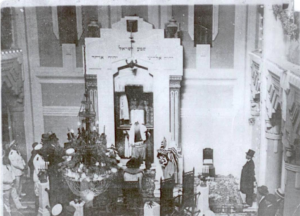Libyan Jews and merits, the Italian Court of Audit changes course
In the long and tormented incident of the Italian Ministry of Economy and Finance’s granting of merit allowances to those who were persecuted by the Fascist regime for being Jewish, either in Italy or in the territories where racist laws were applied, such as Libya or the former Italian colonies, it is worth mentioning a recent judgement, which we could define as courageous, in the framework of the seesawing jurisprudence of the accountant-magistrates dealing with this matter.
 I am referring to the judgement of the Italian Court of Audit, specifically the First Central Jurisdictional Section of Appeal (no. 349, published on 15.09.2021), which overturned the previous decision of the Court of First Instance with which the Court of Audit of Lombardy had rejected, with judgement no. 195 of 18.07.2019, the appeal of an Italian Jewish citizen of Libyan origin, who had applied in 2016 for a life allowance of merit provided for in Article 3 of 22.12.1980, no. 932.
I am referring to the judgement of the Italian Court of Audit, specifically the First Central Jurisdictional Section of Appeal (no. 349, published on 15.09.2021), which overturned the previous decision of the Court of First Instance with which the Court of Audit of Lombardy had rejected, with judgement no. 195 of 18.07.2019, the appeal of an Italian Jewish citizen of Libyan origin, who had applied in 2016 for a life allowance of merit provided for in Article 3 of 22.12.1980, no. 932.
The Italian Commission for Contributions to Politically Persecuted Anti-Fascists and Persecuted on the Grounds of Race had denied the treatment, as the alleged events had been considered generic and not appearing as acts of persecution, in view of the historical events (French and British air raids) that had led the residents to leave the city of Tripoli to take refuge in less-exposed locations such as, specifically, Garian in 1940.
In the same way, the judgement of the Milanese magistrates stated that the appeal should be rejected inasmuch as allegedly neither did it specify “what the lamented ‘persecution and harassment’ were, nor could it be excluded with the necessary certainty that the family’s flight to Garian was not due to the consequences of the racist laws but to other causes”.
The appellant had also pointed out how the most recent legislation (art. 1, paragraph 373, law no. 178/2020) had established that, as for the case of persecution for racial reasons, acts of violence or maltreatment suffered in Italy or abroad were to be presumed unless proven otherwise, thus regulating the issue of the burden of proof. On this point, however, the Court held that the new legislation does not have any retroactive effect. It is instead “aimed at the future and cannot concern positions which already exist, and which must be dealt with on the basis of the depositions existing at the time when the administrative application was made”.
Here is the first relevant aspect of the Central Court’s pronouncement: the overturning of the first-instance judgement is not due to the significant innovation which led to Law no. 178 of 2020, which decreed, after decades of the Terracini Law’s force, that there is no need to prove persecution for those who, as Jews, lived through that period. This shows that, by correctly applying the existing rules, it is possible, and necessary, to recognise the existence, the tragedy and the impact of racist laws on those who had to suffer them.
It is also necessary to ask one further question: what is the innovation for which the Court found the circumstances alleged by the appellant to be sufficient to demonstrate the existence of persecution on racial grounds? In the period from 1941 to 1943, the family of the appellant, who was born in 1940, was forced to move from its residence in Tripoli to Garian in order to escape persecution against the Jews. Perhaps for the first time, or in a rather rare case in the framework of judgements that we have been accustomed to reading in the recent years, the Court of Audit, making a decisive “step forward”, to which we will return shortly, based its conviction on the circumstances “reported in a sufficiently specific way in the historiographic documentation producred by the party and specifically in the book Jews in an Arab Land: Libya, 1835-1970 by Renzo De Felice”, in which there appears – in this case in a footnote – “a context in which the Fascists did not want to put up with or see any Jews in their way, and many of them, who tried to reach other locations by train, were forcibly made to get off on the argument that they ‘stank’ “. And again, the judgement states: “In the introductory appeal it is also reported that the family was… one of the best known and most involved in the Jewish community of Tripoli”, referring to the words of another author quoted by the appellant’s defence (Emiliano Di Silvestro, La tormentata storia degli ebrei di Libia, second volume, in Limes, February 2013).
Hence the principle highlighted by the judges of the Court of Rome: “From the documentary compendium produced in court by the present appellant, conclusion can be drawn that, subjectively, the family to which the present appellant belonged was the victim of violence, so much so that it was induced to move to an inland location, Garian, to avoid being exposed to further negative effects”. It follows from this assumption, which is innovative because it considers historiographic investigations to be evidence, that “the injury to a person’s right is not sufficient to give rise to a right to one of those allowances on the part of the injured party: it is necessary that the acts of violence are motivated by persecutory intent, determined by the racial condition of the injured party, with the caveat that the racial motivation can be presumed where the violence… has affected a subject belonging to the discriminated community”… It is necessary, moreover, that they were carried out by “persons employed by the State or belonging to Fascist military or paramilitary formations, or emissaries of the Fascist party”. It is therefore necessary that the damaging acts are attributable to the persons indicated by the regulations, according to the usual criteria of subjective charge of actions, and thus with application of the general principle according to which not preventing an event that one has the possibility of preventing from happening is equivalent to causing it. As a consequence, not only the acts of violence committed directly by the above-mentioned persons, but also those ordered, promoted or, in any case, not prevented by them, should it be possible to prevent them, shall be considered as committed by them.
In a certain way, such a principle goes against the trend with respect to an orientation that, until recently, made judges write that “a generic state of unease and fear of unfortunate events, induced by the general anti-racial policy of the authorities of the time” is not sufficient. Moreover, this state of fear and the consequent need to hide could not but be common to the entire Jewish population at that time” (Central Court of Audit, no. 507/2015). We are thus dealing with a “change of course by the Court of Audit”, as Riccardo Bencini defined it on 27 January in a comment on the judgement in the daily newspaper Diritto e Giustizia.
Nevertheless, it must be added that this change, which is hoped to be continued by the accountant-magistrature, as well as the Commission established by the Prime Minister’s Office to ensure the contributions to the persecuted on the ground of race, it is perhaps also due to the initiative carried out with determination by the Union of Italian Jewish Communities in recent years, through the raising of consciousness of the Presidency of the Court of Audit, until the lessons held last year to hundreds of magistrates at the School of Advanced Training of the Court on the situation of recognition of racial persecution and critical issues arising in many pronouncements. Such critical issues have led to consequences, resulting in measures of refusal, in administratively or judicially speaking, sometimes devastating for those persecuted who could not prove the persecution suffered, albeit described in great detail.
Unfortunately, beyond the narrow perimeter circumscribed by the Terracini law to qualify racial persecution, the phenomenon has often depended on a lack of knowledge of that particular history of those who must apply the law to the historical events to which it is necessarily linked.
Yet, we should never forget that “history has always permeated law and is part and parcel of it”, because “there is no law without the history of law and the jurist, even without any vocation or competence as a historian, has always investigated and reconstructed the rules in their genesis and development over time” (Giorgio Resta-Vincenzo Zeno Zencovich, in Riparare Risarcire Ricordare. A dialogue between historians and jurists, 2012).
*UCEI Vice-President
Above, a period photo of the Dar Bishi synagogue in Tripoli during an official visit – ASTREL.
Translated by Gianluca Pace and revised by Alida Caccia, students at the Advanced School for Interpreters and Translators of the University of Trieste, interns at the newspaper office of the Union of the Italian Jewish Communities – Pagine Ebraiche.

